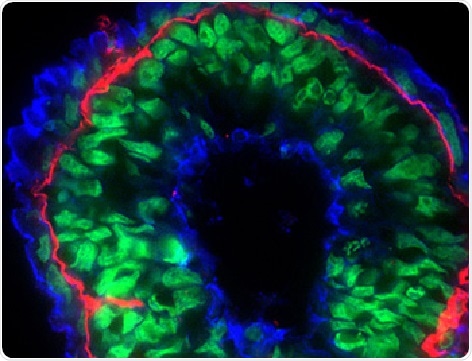Sponsored Content by AbcamFeb 5 2019
The dynamic processes that occur during the growth of actin, via polymerization, and the breakdown of actin both play significant roles in cellular mechanisms like migration and adhesion.
Due to the critical role that actin plays in these processes, cancer and cardiovascular research is currently focusing on understanding the molecular processes that occur during actin reorganization.
This article explores key molecules for research into actin polymerization. These include regulatory proteins/cofactors, nucleators and toxins.
Regulatory Proteins/Cofactors
Thymosin β4 is a protein that facilitates filament polymerization by G-actin-sequestering. It can be detected using an Anti-Thymosin beta 4 antibody and is available for labs as Human Thymosin beta 4 peptide.
Cofilin encourages depolymerization by promoting dissociation of actin monomers from the actin chain. Detection can be achieved using one of two antibodies (Anti-Cofilin antibody or its phospho S3 form) and cofilin can be acquired by labs in either a human or recombinant form.
Profilin assists polymerization by regulating the creation of ATP-actin monomers to add to the growing actin chain. Detection is possible using the antibody Anti-Profilin 1 and profilin is available for researchers in a recombinant form - Recombinant Human Profilin 1 protein.
Nucleation Factors
Formins are a group of nucleation and elongation factors that promote the formation of linear actin chains. They can be detected using either an Anti-DIAPH1 or Anti-FMNL2 antibody. Formins are inhibited by SMIFH2.
Spires are organization factors that promote polymerization by bringing actin monomers together to form a prenucleation scaffold. Detection of Spires is possible using an Anti-SPIRE1 antibody.
The ARP 2/3 complexes behaves as a nucleation site for actin by mimicking the structure of an actin trimer. ARP 2 and 3, unlike formins, promote the formation of branched chains (see figure 1). The complexes can be detected by the Anti-Arp2 and Anti-Arp3 antibody, both complexes can be inhibited by CK666.
WASp is a regulatory cofactor that regulates the formation of complex ARP 2 or ARP 3. Researchers can detect WASp using Anti-N WASP antibody or inhibit it using Wiskostatin.
Toxins
Phalloidin inhibits the depolymerization of actin by tightly binding to actin in filaments, which stops them from being able to dissociate.
Jasplakinolide induces the polymerization of actin and stabilizes actins monomeric form.
Chaetoglobosin A is an actin polymerization inhibitor.
Latrunculin has two forms (A and B) and inhibits the polymerization of actin by binding to lone monomers, this has the overall effect of promoting filament disassembly.
Cytochalasin has five different forms (A, B, C, D and E), all of which prevent both actin filament assembly and disassembly by binding to the plus ends of the filaments.
Tools for the Visualization of Actin

Figure 1. CytoPainter F-actin Staining Kit - Blue Fluorescence (ab112124). F-actin was stained with CytoPainter blue in mouse embryonic stem cell-differentiated embryoid bodies using ICC/IF. Image courtesy of Dr. Shaohua Li, UMDNJ-Robert Wood Johnson Medical School.
 About Abcam
About Abcam
Abcam is a global life sciences company providing highly validated antibodies and other binders and assays to the research and clinical communities to help advance the understanding of biology and causes of disease.
Abcam’s mission is to serve life scientists to help them achieve their mission faster by listening to their needs, continuously innovating and improving and by giving them the tools, data and experience they want. Abcam’s ambition is to become the most influential life science company for researchers worldwide.
Sponsored Content Policy: News-Medical.net publishes articles and related content that may be derived from sources where we have existing commercial relationships, provided such content adds value to the core editorial ethos of News-Medical.Net which is to educate and inform site visitors interested in medical research, science, medical devices and treatments.